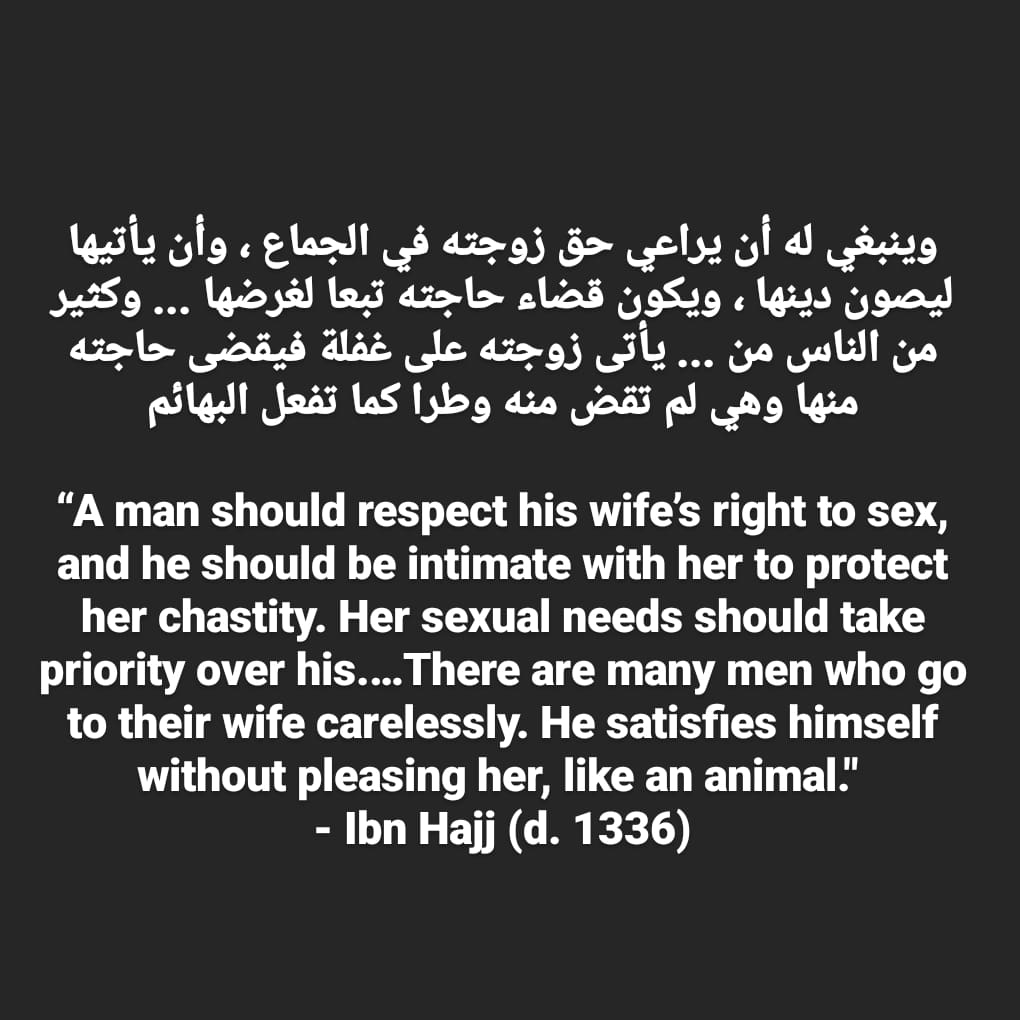O R A L S E X I N I S L A M
"It is permissible to kiss the wife's genitalia before intercourse, but it's disliked after that." - [East African scholar] Ata ibn Rabah mentioned this, according to al-Qadhi in al-Jami'
[al Insaaf, Kitab an-Nikah]
"It is permissible to kiss the wife's genitalia before intercourse, but it's disliked after that." - [East African scholar] Ata ibn Rabah mentioned this, according to al-Qadhi in al-Jami'
[al Insaaf, Kitab an-Nikah]

Is Oral Sex Permissible in Islam?
Oral sex (fellatio and cunnilingus) is permissible in Islamic law, according to Muslim scholars as there is nothing to explicitly suggest that oral stimulation within a lawful relationship is forbidden by Allah or His Messenger (peace be upon… twitter.com/i/web/status/1…
Oral sex (fellatio and cunnilingus) is permissible in Islamic law, according to Muslim scholars as there is nothing to explicitly suggest that oral stimulation within a lawful relationship is forbidden by Allah or His Messenger (peace be upon… twitter.com/i/web/status/1…
The permissibility of oral sex is explicitly stated in classical texts of fiqh (Islamic law) by premodern jurists. Hanbali texts mention kissing genitals, Shāfi’ī texts mention sucking the clitoris, Hanafi texts mention the permissibility of oral stimulation, and Mālikīs talk… twitter.com/i/web/status/1…
Premodern scholars said genital kissing is permissible, however many modern Indo-Pak and Arab scholars say it's prohibited or disliked as they viewed it as "disgusting" and "shameful." Interestingly, many African scholars from early Islam held a different attitude towards oral… twitter.com/i/web/status/1…
Who was Ata ibn Abu Rabah?
Ata ibn Abu Rabah (d. 733) was a legal scholar, hadith transmitter and mufti of Mecca in the late seventh and early eighth centuries of the common era. Ata was a dark-skinned black man of east African origin. He was a respected religious authority who… twitter.com/i/web/status/1…
Ata ibn Abu Rabah (d. 733) was a legal scholar, hadith transmitter and mufti of Mecca in the late seventh and early eighth centuries of the common era. Ata was a dark-skinned black man of east African origin. He was a respected religious authority who… twitter.com/i/web/status/1…
Muslim Woman Teaching Sex Education To Male Scholars
Sulayman ibn Musa was asked whether a husband is permitted to look at his wife’s genitalia. He said, “I asked Ata [ibn Abu Rabah] and he told me that he asked [the Prophet’s wife] Aishah. She mentioned this hadith [“I used to… twitter.com/i/web/status/1…
Sulayman ibn Musa was asked whether a husband is permitted to look at his wife’s genitalia. He said, “I asked Ata [ibn Abu Rabah] and he told me that he asked [the Prophet’s wife] Aishah. She mentioned this hadith [“I used to… twitter.com/i/web/status/1…
The aforementioned hadith contradicts, a number of unreliable and fabricated hadiths that were circulated to discourage looking at the spouse’s genitalia. In a dubious report, Ibn Abbas narrated that the Prophet (pbuh) allegedly said, “When any of you have sex with his wife or… twitter.com/i/web/status/1…
Another fabricated report states that Abu Hurayrah narrated that the Prophet (pbuh) allegedly said. “When any of you have sex, he should not look at the genital area because it may cause blindness. He should not say much, because it may cause dumbness.” [Daylami].
Ata ibn Abu Rabah was a prominent scholar and jurist of east African origin. He studied Islam under a number of scholars including Ibn Abbas, Ibn Umar and Aishah. Ata served as the mufti of Mecca in the late seventh and early eighth centuries. In early Islam, female scholars… twitter.com/i/web/status/1…
For more information on the cultural history of Muslim scholars' rulings and attitudes towards sex, read;
• Sex Education For Husband and Wife: Women's Emancipation during the Prophet’s Lifetime by Abd al-Halim Abu Shuqqah
• A Taste of Honey: Sexuality and Erotology in Islam… twitter.com/i/web/status/1…
• Sex Education For Husband and Wife: Women's Emancipation during the Prophet’s Lifetime by Abd al-Halim Abu Shuqqah
• A Taste of Honey: Sexuality and Erotology in Islam… twitter.com/i/web/status/1…
• • •
Missing some Tweet in this thread? You can try to
force a refresh

 Read on Twitter
Read on Twitter












